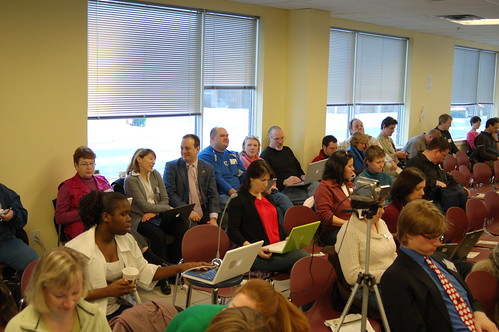 |
|
|
[Live blogged! Please forgive spelling and awkward wording]
The question to the panel has changed to what does education reform look like, in light of a new president.
Lehmann says that accountability has to be a richer more complext conversation. Should be less conformist in nature.
Marc Mannella (Principal, KIPP Philadelphia).
Betty Manchester, of the Maine Learning Initiative, comes from 1:1 learning environments. She now manages the Maine International Center for Digital Learning (cool). She says there are eight things that have to be present for reform to work and support to take place.
- Having a moral purpose
- Commitment to changing everything
- Focus on deep levels of learning
- Intelligent accountability (evidence of learning that students bring in)
- Assessment for learning
- Lateral capacity (building those networks)
- Paying attention to the energy
- Long level of leadership
Mike Wang, of Teach for America. They recruit college students to teach for two years. What nice about today is that, while we use to have to talk about theory, today we have some data on ways of
Themes
- Human Capital (people)
- The use of data
- Unyielding exceptions expectations
One thing that is unique thing about the Obama administration is that his administration seems able to dive into contentious issues and find consensus.
David Bromley has been a high school teacher, school founder, director, and district administration. Now is with the big picture company. They form forward looking schools. He is cautiously optimistic. School is still the only industry that still doesn’t get it. We have to fundamentally change how we look at kids, or else we are not going to make the change. We have to change everything.
Gary Stager “I dream of America where the person who is in charge of education is qualified.” Someone else has changed him immediately about Arne Duncan. He goes on to say that we know a lot about what works, and we’ve known it for a long time (referring back to Dewey, et al.). He seem unoptimistic.
But, he believes
- We must not rank or sort,
- decisions should be made by teachers and parents,
- art dram music, thinking, computer science, (We could provide a computer for every kid and a cello)
- School should represent the best 6 or 7 hours of the child’s day
- intiteld to a talented passionate teacher.
- Multi-age homogeneous environments
- learning is nature
- always wrong to be mean to children (teacher shouldn’t scream at children — says it seems to happen at testing time)
- External assessment is aways disruptive to learning.
Considering replicability (?), Lehmann says that processes can be replicable. But curriculum can not. It’s about people.
Question: Can we do with with the teachers we have? Gary Bromley says that the are making a change with kids with today’s teachers. There are a lot of teachers who want to work differently with kids.
Betty speaks as the oldest member of the panel speaks for older teachers, who taught in the 60s and 70s still have the passion and the desire to do it a different way. But the policy and the message from the top has to change at the national and the state level. There also has to be a feedback, and open feedback system (pay attention to the teacher).
Mike says, “Are we going to let perfect be the enemy of good?” I’m not sure a understand what is meant by this, but want to.
How do you deal with administration that just doesn’t get school reform. We have to show them models of success. We need more democracy. Parents can make decisions. Teachers should be able to work in places where they share in the leadership. You can ask parents which teachers is the most creative, which teacher uses the most worksheets and they know. Speaking out against single soslution, one-side-fits-all.
Should NCLB die. Stager says, yes. It isn’t that we haven’t fully funded it. He says, “Thank God!” We’re beating kids with the buts of rifles because we can’t afford the bullets.” I love it!
Marc says, “This is a very fun panel.” Says he agrees with 92% of what’s being said. Says, “Minimum expectation is our lofty goal, is what’s wrong with NCLB.” Says that data disaggregation is a major move forward.
Lehmann says that standards-based state testing is not improving education. Others are saying
I just twittered: “The point of ed reform is having classrooms where it just doesn’t matter if kids are getting tested — to them or the teachers.”
What about diversity in teachers and other educators who are looking to retool teaching and learning. We look around the room, and the majority is white, though diversity is higher than it usually is in these meetings. Betty says that it is usually about money.

Thank you for live blogging this and sharing your notes. It was a fun panel to watch and listen to. I have one note however. Mike Wang said “Unyielding expectations” – not exceptions. This word changes the impact of what he’s trying to say.